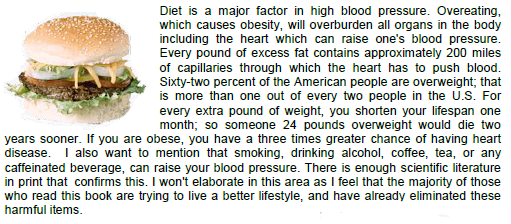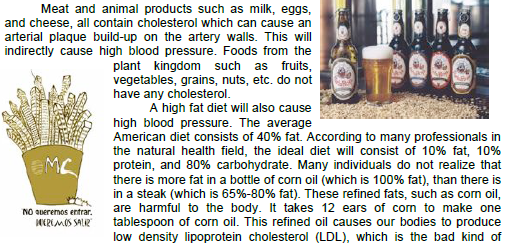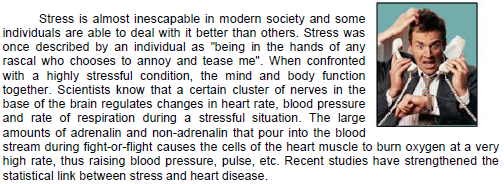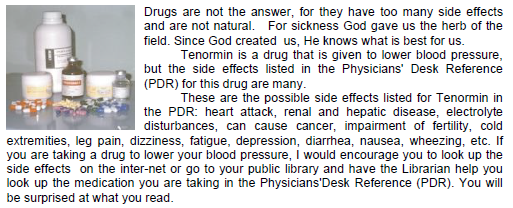HIGH BLOOD PRESSURE
THE HEART

Can a person strain his heart by overwork? No, it is almost impossible to strain the healthy human heart by overwork. The heart is far more likely to be damaged by disease and by poor habits of living than by any physical activity. But once the heart has been damaged by disease, it may be necessary to avoid too much activity. A heart that has been damaged can be strained beyond its limits.
The heart is a very efficient four-chambered pump, actually two pumps, one to move blood to the lungs, the other to push it out into the body. Every day it pumps blood through 60,000 miles of blood vessels, and pumps enough blood to fill a 4,000 gal on railroad car. As long as you are alive, your heart never stops working. It has enormous reserve powers to meet any crisis that may arise. If it has been damaged by disease, it repairs itself while it works! If its valves become thickened because of some disease, such as rheumatic fever, the heart will thicken up its own muscular walls to try to compensate for any lack of efficiency. Even while your heart is working, its own muscle cells are busy selecting the materials they need for their own growth and repair.
PULSE RATE
Relatively little attention is paid these days to the heart rate or pulse. The heart typically beats 70-80 times a minute when an individual is sitting down. This adds up to over 100,000 beats per day. However, under physical or mental stress the body requires more oxygen and the heart accordingly steps up the pace to perhaps 150-200 beats a minute.
Athletes have low pulses, especially long distance runners, whose rates can normally be 35 to 40 beats per minute. Women's rates are general y higher than men's. Children and babies have still higher rates, from 80-150 beats per minute.
A healthy individual, who has a resting pulse rate of 70 beats per minute in comparison with a weaker individual who has a resting pulse rate of 90 beats per minute, will not be overtaxing his heart. A difference of 20 beats per minute over a 24 hour period adds up to 28,800 extra beats the weaker individual's heart has to beat per day. Obviously, with everything else being equal, the heart pumping away at a faster rate will not last as long as one pumping at a slower rate.
The average individual has 51/2 quarts of blood and the normal heart at a normal rate will pump or recycle thousands of gallons of blood every day.
The amount of blood pumped by the heart with each contraction can vary from 2 to 5 ounces per stroke. The heart with a high stroke volume and low pulse is a far stronger and healthier organ than the heart with a low stroke volume and high pulse.
Since the heart has to beat 24 hours a day it has to get its rest in between beats. The interval between beats is only half a second normal y, which seems like very little time for the heart to rest and repair itself. But it's enough, and here's why. At the rate of 70 beats per minute the heart rests approximately half the time and works the other half. This means that in a 24 hour period it gets 12 hours of rest. But if the heart rate goes up, the extra beats take away from the rest period. So when your pulse is higher than 70 beats per minute, your heart is working more than it is resting. At a rate of 90 beats per minute it's on the job approximately two-thirds of the time and resting only one-third.
BLOOD PRESSURE

High blood pressure is general y defined as sustained elevated systolic and/or diastolic blood pressure. There is no fixed dividing line between normal or abnormal The World Health Organization recommends that your blood pressure stay below 140/90. However, I have personally observed that in Central America where the people have a more natural diet and exercise more, that their blood pressures will average around 110/60. This is what I consider a normal blood pressure.
Individuals with blood pressure of 140/90 or above were found to have a substantially increased mortality. 73% of the men and 81% of the women who died had blood pressures of 140/90 or above. The higher the blood pressure, the higher the incidence of sudden, unexpected death. After the age of 55 those with high blood pressure had four times as many heart attacks and more than seven times as many strokes(1). Contrary to most learned opinions, diastolic blood pressure is, apparently, not more important than the systolic. The famous Framingham study showed that elderly individuals with high systolic pressures had their significantly higher mortality rates than contemporaries with lower systolic pressures.(2).
WHAT CAUSES HIGH BLOOD PRESSURE?
High blood pressure is largely self-induced by the way we live. I believe there are four major factors which cause high blood pressure. They are lack of water, poor diet, lack of exercise, and stress. I want to cover each one in a general way as there are volumes of material in each of these four areas linking them with high blood pressure.
LACK OF WATER
Our blood is over 78% water and when we do not drink enough water, (see chapter on water), our blood becomes thick. And since the heart is a pump that circulates the blood through out the body, when it has to circulate thick blood this is going to raise your blood pressure. I have been able to lower many individuals blood pressure by simply getting them to drink enough water.
DIET


cholesterol(3). When we eat these refined oils, they coat our red blood cells and make them sticky. These cells clump together and do not flow as well , thus causing the blood pressure to rise.
An excessive intake of salt can be related to high blood pressure. The average American eats from 14 to 30 times more salt than he needs daily. We actually need only one-fifth of a teaspoon of salt per day. However, the average salt intake by an American adult, according to figures released by the National Research Council, is between two and one half to six teaspoons per day.
Recent studies have shown that salt is only a minor issue in high blood pressure. Although salt restriction may lower blood pressure a few points, a growing number of authorities on this subject say that only about 10% of the population would benefit appreciably from this(4). Fats contribute to high blood pressure in a far greater degree than the use of salt.
LACK OF EXERCISE
Movement is life. Inactivity is death. We live in a push button society which is sending us to the grave years before our time. Exercise will improve the tone of your muscles and blood vessels, changing them from weak tissue to strong tissue. Exercise will increase the efficiency of your heart in several ways. It will grow stronger and pump more blood with each stroke and it will lower your pulse rate and help lower high blood pressure. Walking outdoors in the fresh air and sunshine is the simplest and best exercise one can do. Low impact exercise such as walking, cycling, swimming or hiking is more beneficial than high impact exercises such as jogging, basket ball , weight lifting, etc.
STRESS

In a study of 150 middle-aged men, Swedish scientists found that those who experienced a high degree of psychological stress were six times more likely to develop coronary heart disease within five years than those who reported relatively little stress. Many times we bring about stressful problems by not thinking and planning ahead or making wrong choices.
HOW TO CONTROL HIGH BLOOD PRESSURE
By eating a completely natural diet and drinking a minimum of eight glasses of pure soft water daily, more if you are overweight. By getting plenty of exercise daily, especially outside in the fresh air and sunshine, whenever possible. By taking time to rest physical y and mentally every day with 7 to 8 hours of sleep each night. By handling stressful situations by taking them to God.
A very good food to use to lower blood pressure is raw garlic. I have found a way to get it down if you are not real crezy about the taste and odor. Take and put one glass of orange juice or lemon juice in a blender add two cloves of raw garlic and blend them up, let them sit 20 minutes then strain and drink. A very good herb to use to lower blood pressure is Hawthorne Berries. Always use distilled water or Reverse Osmosis water when making the herb tea. Bring water to a boil; remove from heat and add 1-2 tsp. herb per 8 oz. of water. Cover and let steep 20 minutes or longer, then strain and drink. It's best to have 2 or 3 cups daily. One in the morning when you first get up, one approximately one hour before your noon meal and one right before you go to bed. Garlic is also good for lowering blood pressure. Use only fresh raw garlic; take it with your meal.
WHAT ABOUT MEDICATIONS TO LOWER BLOOD PRESSURE?

STUDY CONFIRMS HIGH BLOOD PRESSURE MEDICATIONS KILL
MORE THAN THEY CURE
A large scale government funded Multiple Risk Factor Intervention Trial (MRFIT), which was a study costing more than 150 mil ion dollars, found that the coronary mortality was 70% higher in a group of hypertensive patients that received aggressive treatment when compared to a control group who received no treatment(5). Considering the potential harm of Thiazide Diuretics, Dr. Freis recently challenged the concept of drug therapy for mildly hypertensive patients. In his editorial in the New England Journal of Medicine entitled "Should Mild Hypertension be Treated?" he points out that the treatment could be worse than the disease(6).
(1) Kannel, W.B.: Role of Blood Pressure in Cardiovascular Disease: The Framingham Study, Angiology26:l, 1975
(2)Ibid.
(3) Jay Milton Hoffman, Ph.D., The Missing Link, Professional Press, Valley Center, 1984, pg. 353
(4) Health Freedom News, Is the Anti-Sodium Warning Worth It's Salt? Sept. 1991, Pg. 8
(5) MRFIT: Risk Factor Changes and Mortality Results, (1982) JAMA 248: 1465-1477
(6) Freis, E.D., (1982) Should Mild Hypertension Be Treated? (editorial), New England Journal of Medicine, 307, 306-309









